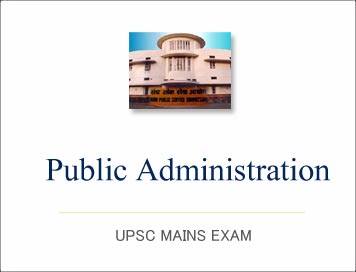Public Administration Mains 2018 : Solved Paper Public Administration : Paper-2-Question-8

Public Administration Mains 2018 : Solved Paper Question Paper-2 (Question-8)
SECTION-B
Q8. a. "Effective public grievance redressal requires administrative commitment. But process reengineering can help prevent some grievances.” Discuss. (Civil Services)
ANSWER: ONLY FOR PAID MEMBERS
b.“Institutional change is a necessary but not a sufficient condition for reducing criminalisation of politics." Examine. (Law and Order Administration)
ANSWER: ONLY FOR PAID MEMBERS
c. "The disempowerment and depoliticisation of urban local government has happened in multiple ways.” Comment. (Urban Local Government)
ANSWER: The disempowerment and depoliticisation of urban local government has happened in multiple ways. The “implementation failure” narrative tends to focus on how local governments are financially constrained and do not have the administrative capacity to carry out its functions. It is also important to explore how urban local governments are actively disempowered and depoliticised as an institution.
The disempowerment and depoliticisation has happened in multiple ways.
- Elected representatives at the city-level are rendered powerless by making them subservient to the State government. In most municipal corporations, while the mayor is the ceremonial head, the executive powers of the corporation are vested with the State government-appointed commissioner. This disjuncture in municipal governance has been exploited by State governments to ensure that no city-level politician challenges their control over a city.
- Municipal corporations are further denied their political role by the continued operation of various parastatal agencies created by the State government. These agencies, which function with a certain autonomy, are accountable only to the State government, not the local government. Even urban planning and land-use regulation (globally a quintessential local government function) is with State government-controlled development authorities.
- Even for performing functions that are within its purview (such as levying local taxes or undertaking civic projects above a certain budget) the local government requires State government permissions. Hence, municipalities are not yet autonomous units that can be genuinely called as the “third tier” of government in India’s federal system. Even after the 73rd and 74th Amendments, India has effectively only two levels of government — Union and State.
- The functions listed under the 12th Schedule — which a State government is expected to devolve to the local government — do not include essential civic issues such as urban transportation, housing or urban commons.
- The 74th Amendment also contains an industrial township exception whereby a municipality need not be constituted in areas which are declared as industrial townships. These provisions have been employed by State governments to keep local governments weak.
- In fact, civil society’s fixation with nominating its members into ward committees can further depoliticise local governments and make them captive to the interests of certain elite resident welfare associations. Instead of distrusting them, we must acknowledge that local governments are inherently political spaces where multiple interests compete.
